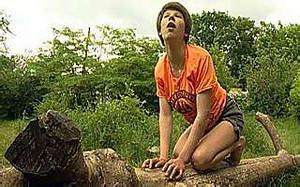Rachel Calton passes an animal keen eye over last night's beastly Channel 4 documentary
From the outset I expected Mindshock: Feral Children (Channel 4, 9pm) to be an X-Files type expose, but it was unveiled to be more suspiciously like a Discovery Channel filler bought by Channel Four to add to its profile of (sometimes gratuitously) weird human phenomena programmes; the real life 'Who ate Gilbert Grape' fat person, the family who walk on all fours, twelve year olds who still breastfeed etc.

But where Channel 4 docs usually carry an edgy and disturbing phenomena, coupled with rational documentary making, in tune with the moral bearings of its audience, this programme left me more concerned about the programme makers than the neglected children bought up by stray dogs in small Ukrainian villages - potentially quite a crowd-puller I thought.
The sympathetic footage of the Ukrainian father, making utterances about having mislaid his wife, (after leaving his three year old in the yard so long she decided to turn to dogs for company) to the unquestioning account of the child who was returned to her mother (the same mother who failed to protest to her husband about keeping the daughter in a cage in the front room of the house for 13 years) gave this documentary so little moral bearing you felt you had entered a void of lost reasoning. Parts of it would have seemed no more absurdist if billed 'a defence of parenting today'.
Whilst straight reported facts such as 'without a mother to love him he turned to wild dogs' made this on the edge of spoof-like, throw away comments such as 'with the collapse of the soviet union, more children turned to dogs… The authorities began to be concerned' showed there to be unexplored depths of sinsterism here, which anyone making the documentary seemed to fail to acknowledge.
The programme, however, claimed to be giving us the answer to, the modestly proposed question, 'what makes us human?' And apparently the ability to grasp grammar was a fair conclusion. I had no idea until watching this that my grasp of grammar is what defined me as part of the human race.
One point that was interesting was whether feral children had missed the window of opportunity in which to learn a language in the time they spent without human contact, which in some cases they had.
But this, seemingly scientific valid point, was lost amongst everything from the account from the city detective who once discovered a feral child, to the random array of clinical/ psychological/ educational/ linguistic/ child trauma/ dog psychology specialists who were called in to inform viewers that the line drawing they had just watched a feral child draw was 'not a sophisticated drawing' and that in the five years Oxana, the main case study in the programme, spent with dogs, she failed to pick up human language.
The fact that the footage of a rescued Oxana living and socialising in a close supported community was not enough to say she would be accepted in the outside world, seemed to detract from what could otherwise have been quite a life-affirming story.
A programme which failed to morally question the material it documented, and without the balls to look at the unanswered questions around these cases of neglect, meant I might as well have watched a bunch of unneglected children run round like animals on Big Brother.
Body Shock seemed to be a gritty and eye-opening series for Channel Four, Mind Shock was a shocker of a follow up, fooling at least one cheated viewer.
No comments:
Post a Comment